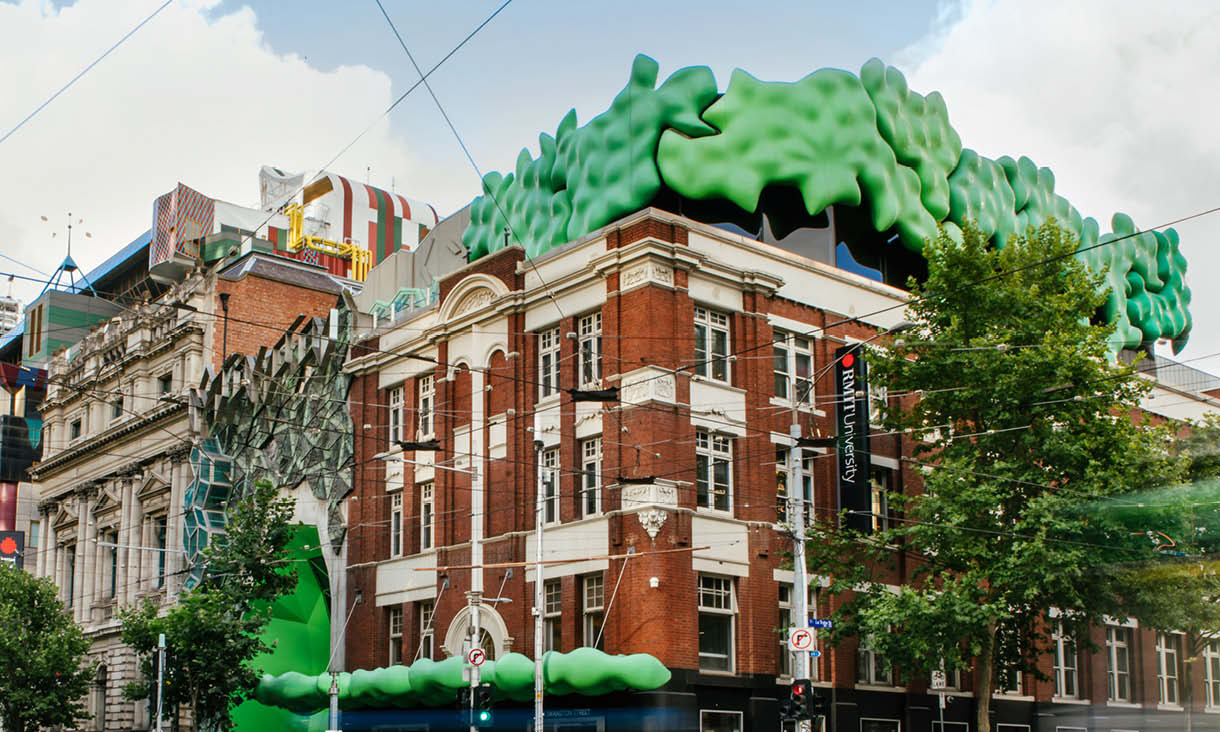RMIT Culture's Design Hub Gallery presents Bombay Tilts Down, 2022 and A Photogenic Line, 2019 by renowned Mumbai-based artist group CAMP.
In this pair of large-scale works, CAMP explore two sides of their practice; one that produces experimental film and video, often with unusual equipment and angles of participation, and another that creates and animates archives of moving images, documents and photography. The two works are united by their re-spatialisation of places and history and by becoming temporal structures of what could be or could have been. Both suggest, in a reworked cinematic tradition, that seeing is not passive and can reassemble concrete realities.
Bombay Tilts Down (2022, 13 mins, 6+1 screens) was filmed with a 4K CCTV camera from a single point on a 36-floor building in central Mumbai, while being watched by people in the city below.
A Photogenetic Line (2017, cutout photographic montage) assembles photographs from the archive of The Hindu, a left-leaning Indian national newspaper, in a sequence where "one photograph calls the next'', via a series of rules. In this allusion to a filmic edit, we walk through small and big historical events with their original captions, now inside a non-narrative, unstable and eerie political assemblage.
CAMP
CAMP is a collaborative studio founded in Bombay in 2007. It has been producing fundamental new work in film and video, electronic media, and public art forms, in a practice characterised by a hand-dirtying, non-alienated relation to technology. CAMP's projects have entered many modern social and technical assemblies: Energy, communication, transport and surveillance systems, ports, ships, archives – things much larger than itself. These are shown as unstable, leaky, and contestable "technology", in the ultimate sense of not having a fixed-function or destiny, making them both a medium and stage for artistic activity.
From their home base in Mumbai, they co-host the online archives pad.ma (est. 2008) and indiancine.ma (est. 2013) and run a rooftop cinema for the past 15 years.
CAMP's artworks have been exhibited worldwide, including recent performances at M+, Hong Kong (2023) and MoMA, New York (2023) and solos at Sharjah Art Foundation, (2022) Nam June Paik Art Center (2021), Argos Center for Art and Media, Brussels, and the De Appel Gallery, Amsterdam (2019); at Skulptur Projekte Münster (2017), Documenta 13 (2012) and Documenta 14 film program (2017), in the streets and markets of Bangalore, San Jose, Dakar, Mexico City, Jerusalem, Kolkata, Kabul, Delhi, Ljubljana and Bombay; in the biennials of Shanghai, Sharjah, Gwangju, Taipei, Singapore, Liverpool, Chicago, Lahore and Kochi-Muziris; at film platforms like the BFI London Film Festival, Viennale, FID Marseille, Flaherty Seminar and the Anthology Film Archives, and in art institutions such as Khoj, Sarai-CSDS, KNMA, Lalit Kala Akademi and NGMA New Delhi, Dr Bhau Daji Lad Museum, Bombay, MoMA, New Museum, Queens Museum and e-flux New York, Tate Modern, Serpentine Galleries, and Gasworks London, HKW Berlin, Ars Electronica, Linz, MoMA Warsaw, Ashkal Alwan Beirut, Palestinian Museum, Birzeit, M+ Hongkong, SeMA, Seoul Museum of Art, Art Jameel, Dubai to name a few. In October 2020 they were awarded the 7th Nam June Paik Centre Prize.
CAMP, an RMIT Culture production at RMIT's Design Hub Gallery.


